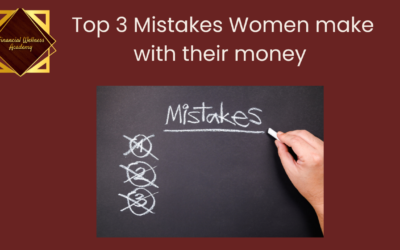Are you feeling dissatisfied with where your money is right now? Maybe you’re wishing for a stronger savings cushion, a more secure emergency fund, or even just the peace of mind that comes with knowing you’re financially prepared. Yet, when you consider starting that journey, you tell yourself, “I can’t afford it.” Here’s the truth – that reasoning is holding you back. If you’re still buying non-essentials, indulging in impulse purchases, or regularly splurging on luxuries, the real issue might not be about affordability. It’s time to rethink your priorities.
Why “I Can’t Afford It” Is Often Just an Excuse
In my experience, this phrase, “I can’t afford it,” tends to come up when people feel overwhelmed by their financial situation. But let’s look at it realistically. Every day, I see people claim they can’t save or invest, yet they’re buying things they don’t need or treating themselves to luxuries. This is where the truth lies: affordability is rarely the issue. It’s about what we prioritise. Many of us are more committed to satisfying today’s wants than preparing for tomorrow’s needs.
The reality is, many of us live with a level of financial complacency. We’re happy to spend money on things that feel good in the moment without considering the long-term cost. The constant “I can’t afford it” mindset can keep us from achieving financial security and peace. And here’s the difficult truth – if you continue ignoring your financial health, waiting for a crisis to finally prioritise it, you’re in for a rude awakening.
Shifting Your Money Priorities: From Extras to Essentials
It’s normal to want to enjoy life, but it’s essential to keep our finances in perspective. How often have you found yourself spending on things that, in hindsight, didn’t add lasting value? Maybe it’s the daily coffees, impulsive online shopping, or treating yourself to the latest tech gadget. While there’s nothing wrong with enjoying these things, they shouldn’t come at the expense of your financial security.
Imagine redirecting just a portion of what you spend on “extras” towards building an emergency fund or setting aside a future-focused savings goal. That £10 coffee habit every morning? Over the course of a year, that could add up to thousands – money that could make a real difference in your financial stability. It’s all about balance, and it starts with prioritising what really matters.
The Cost of Waiting for a Financial Crisis
One of the most dangerous traps is waiting until a crisis to take your financial health seriously. It’s a harsh truth, but many people don’t start saving or investing until they’ve been forced to by a life event, like a sudden job loss, health issue, or unexpected expense. By then, the options are limited, and building a cushion becomes far more challenging.
Imagine going through a rough patch with a financial safety net in place. Instead of relying on credit cards or taking out high-interest loans, you’d have the resources to carry you through. You wouldn’t be scrambling to find solutions or compromising your future for quick fixes. That peace of mind comes only when you make financial security a priority – now, not later.
Are You Really “Too Scared” to Get Started?
Some people hesitate to address their finances out of fear – fear of change, fear of restrictions, or even fear of seeing the full picture. They think that committing to a budget or creating a savings plan will mean giving up what they enjoy. But here’s a different way to look at it: this is not about deprivation. It’s about freedom.
When you make your financial health a priority, you’re not just saving money. You’re buying yourself peace of mind, flexibility, and the ability to make choices from a place of strength. You’re investing in a future where you have options, not restrictions. Fear often keeps us stuck in a cycle of avoidance, but facing your finances head-on is one of the most empowering things you can do.
Breaking Down the Basics: How to Make Saving and Investing a Priority
If the thought of financial planning feels overwhelming, here are some simple steps to get started:
- Audit Your Spending: Take an honest look at where your money is going each month. Break it down into essentials, wants, and luxury items. You might be surprised at how much goes towards things that could be redirected to savings or investments.
- Set Clear Financial Goals: What would make you feel financially secure? Is it having a six-month emergency fund? Investing for retirement? Saving for a big purchase? Identify what would bring you the most peace of mind and work backwards from there.
- Reevaluate Your Priorities: Ask yourself if your current spending habits align with your goals. If you find that your money is going towards non-essentials, make a conscious choice to divert some of that spending towards savings or investments instead.
- Automate Your Savings: If you have trouble sticking to a budget, automate your savings. Set up a regular transfer to a separate account as soon as you’re paid, so you’re less tempted to spend it.
- Build a Budget You’ll Stick To: A realistic budget doesn’t have to mean cutting out everything you love. Instead, focus on allocating a portion of your income towards both savings and responsible spending.
The Empowerment of Financial Security
Here’s the bottom line: being financially secure gives you a powerful sense of control. It’s not about depriving yourself of life’s pleasures; it’s about giving yourself the stability to enjoy them without guilt or stress. Financial empowerment isn’t just a buzzword; it’s the freedom to live life on your terms.
Imagine the confidence that comes with knowing you’re prepared for whatever life throws at you. Imagine the freedom of choosing to spend on things that genuinely enhance your life, without the weight of financial anxiety in the background. Imagine what it would be like to feel in control, not just of your money but of your future. That’s what financial empowerment looks like.
Ready to Take Control of Your Money?
If you’re reading this and feeling the tug to get your finances in shape, don’t ignore it. Making this shift is possible, and it doesn’t require a drastic overhaul overnight. Small, intentional steps can take you from financial frustration to financial freedom. The key is to start, even if it feels uncomfortable or challenging.
If you’d like some support in getting started, or if you’re ready to shift your mindset from “I can’t afford it” to “I’m making my finances a priority,” I’d love to help. Sometimes, all it takes is a fresh perspective and a practical plan to turn things around.
Consider this your invitation to a complimentary 30-minute financial clarity call. We’ll dive into your goals, identify your unique challenges, and outline some actionable steps to get you moving towards the financial security and freedom you deserve.
So here’s the challenge: stop saying “I can’t afford it” and start asking, “How can I make this a priority?” After all, you only get one life. Make it one where you’re not just getting by, but truly thriving.
To Your Financial Wellness,
Caitriona





